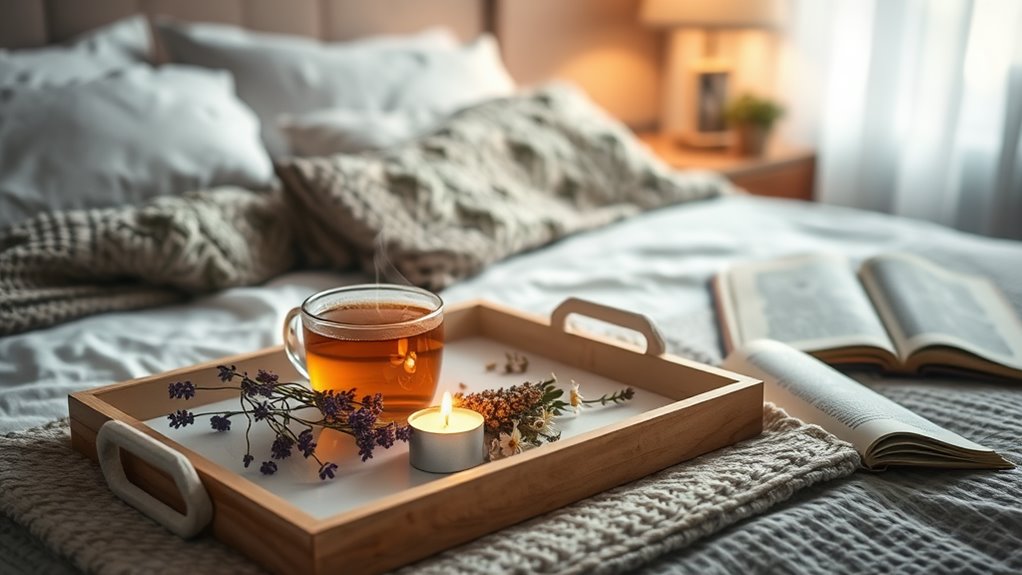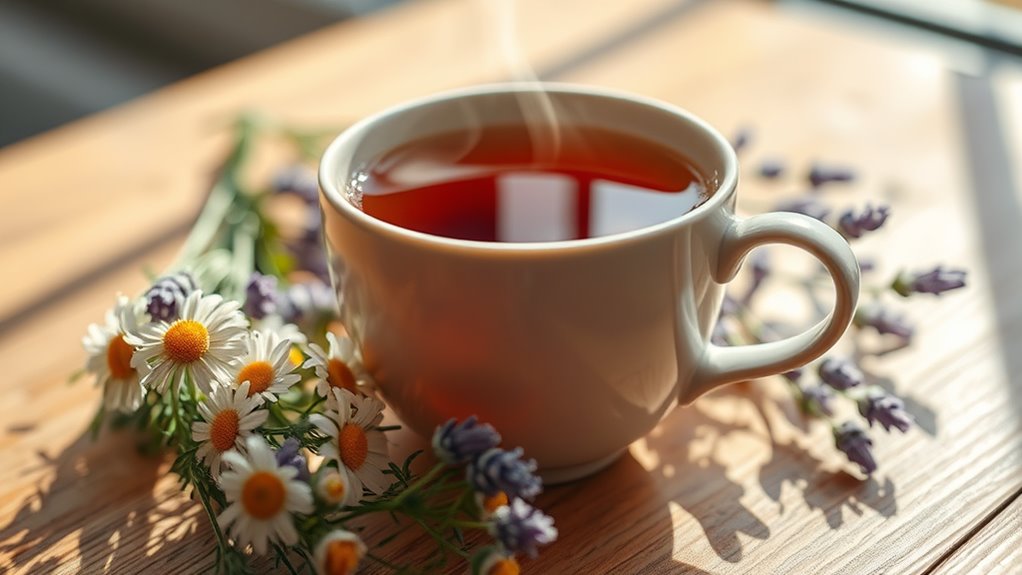Create a Herbal Sleep Ritual That Works Every Night
Creating a herbal sleep ritual can transform your nights, helping you drift into restful slumber. By choosing calming herbs and incorporating them into your routine, you can signal to your body that it’s time to unwind. The right blend can work wonders, but it’s not just about the tea. A holistic approach involves relaxation techniques and an optimal sleep environment. Discover how these elements come together to enhance your nighttime experience.
Understanding the Importance of a Sleep Ritual
As you wind down after a long day, establishing a sleep ritual can be your secret weapon for achieving restful nights and rejuvenated mornings.
A consistent herbal sleep ritual signals to your body that it’s time to relax. This practice fosters a tranquil environment, reducing stress and anxiety.
By incorporating calming herbs into your routine, like chamomile or lavender, you enhance the soothing ambiance and prepare your mind for slumber. Additionally, embracing calming herbal remedies can further amplify the effectiveness of your sleep ritual.
Prioritizing this nightly ritual cultivates a sense of security and comfort, allowing you to drift into a deeper sleep, ultimately improving your overall well-being and daily vitality.
Choosing the Right Herbs for Sleep
Selecting the right herbs for sleep can transform your nightly routine into a calming experience.
Look for chamomile, known for its gentle sedative properties, or valerian root, which can help reduce anxiety and promote relaxation.
Lavender is another excellent choice, offering soothing scents that ease stress.
You might also consider lemon balm, which calms the mind and enhances sleep quality.
Each herb brings unique benefits, so experiment to find what resonates with you. Additionally, incorporating exceptional herbal teas into your routine can enhance the overall calming effects of your sleep ritual.
Preparing Herbal Teas and Infusions
Now that you’ve chosen your sleep-inducing herbs, it’s time to bring them to life through proper brewing techniques.
You’ll find that the way you prepare your herbal tea or infusion can significantly enhance its calming effects. Incorporating calming herbal infusions into your routine can provide additional support for relaxation and focus.
Let’s explore how to create the perfect blend that soothes your mind and body, setting the stage for a restful night’s sleep.
Choosing Sleep-Inducing Herbs
Discovering the right herbs for your sleep-inducing tea can transform your nighttime routine into a soothing ritual. Here’s a selection of calming herbs to consider:
| Herb | Benefits |
|---|---|
| Chamomile | Promotes relaxation and reduces anxiety |
| Lavender | Enhances sleep quality and calms the mind |
| Valerian Root | Helps with sleep onset and improves sleep duration |
Incorporating these herbs into your evening teas can create a peaceful ambiance. Each sip envelops you in tranquility, gently guiding you towards a restful night. Explore these options and find the perfect combination that suits your unique needs.
Brewing Techniques Explained
How can you best extract the soothing properties of herbs for a restful night?
Start by choosing fresh or dried herbs, like chamomile or valerian.
For teas, boil water and steep the herbs for about 5-10 minutes, allowing the flavors and benefits to infuse.
If you’re making an infusion, use a higher herb-to-water ratio, letting it steep longer—up to several hours.
This method extracts deeper flavors and compounds.
Always use a covered container to trap the essential oils.
Strain your brew, add honey or lemon if desired, and sip slowly, letting the calming warmth envelop you before sleep.
Incorporating Relaxation Techniques
As you embrace your herbal sleep ritual, incorporating relaxation techniques can significantly enhance your experience and promote deeper rest.
Start with deep breathing exercises, inhaling slowly through your nose and exhaling through your mouth. This calms your nervous system. You might also try progressive muscle relaxation, tensing and then releasing each muscle group, which helps ease tension. Gentle yoga stretches can release physical stress, preparing your body for sleep. Finally, consider guided meditation or soothing music to quiet your mind. These techniques, paired with your herbal tea, create a holistic approach to achieving a peaceful night’s sleep.
Additionally, practicing meditation tips for beginners can help you quickly calm your mind and enhance your overall well-being.
Creating a Calming Sleep Environment
Transform your space into a sanctuary of tranquility to foster a calming sleep environment.
Start by decluttering your bedroom; a tidy space promotes a peaceful mind.
Use soft, muted colors on your walls and bedding to create a soothing atmosphere.
Dim the lights or incorporate gentle lighting, like salt lamps or fairy lights, to enhance relaxation.
Consider adding calming scents with essential oils or herbal sachets, like lavender or chamomile. Incorporating essential oils can significantly improve your sleep quality and relaxation.
Keep electronic devices away to minimize distractions.
Finally, choose comfortable bedding that supports your body, allowing you to sink into restful sleep.
Embrace these elements for a serene night.
Establishing Consistent Bedtime Habits
Establishing consistent bedtime habits can significantly enhance your sleep quality.
By going to bed and waking up at the same time every day, you train your body’s internal clock, making it easier to drift off at night.
Create a calming pre-sleep routine that includes herbal teas like chamomile or passionflower, which promote relaxation.
Dimming the lights and turning off screens an hour before bed signals your body to wind down.
Consider gentle stretching or meditation to ease tension.
Consistency is key—over time, these habits will help you fall asleep faster and enjoy deeper, more restorative rest each night.





